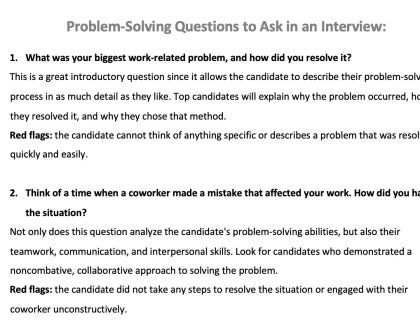
Problem-Solving Interview Questions — PDF Download:
Download our list of problem-solving interview questions in PDF format and use them in your next interview.
Download NowProblem-Solving Questions to Ask in an Interview:
1. What was your biggest work-related problem, and how did you resolve it?
This is a great introductory question since it allows the candidate to describe their problem-solving process in as much detail as they like. Top candidates will explain why the problem occurred, how they resolved it, and why they chose that method.
Red flags: the candidate cannot think of anything specific or describes a problem that was resolved quickly and easily.
2. Think of a time when a coworker made a mistake that affected your work. How did you handle the situation?
Not only does this question analyze the candidate's problem-solving abilities, but also their teamwork, communication, and interpersonal skills. Look for candidates who demonstrated a noncombative, collaborative approach to solving the problem.
Red flags: the candidate did not take any steps to resolve the situation or engaged with their coworker unconstructively.
3. What is your troubleshooting process?
This question gives the candidate a chance to explain their general approach to troubleshooting. It should highlight how the candidate usually processes and acts on information.
Red flags: the candidate demonstrates limited insight into their troubleshooting process or describes ineffective problem-solving techniques.
4. If you were given two very urgent tasks by different members of the management team at roughly the same time, how would you decide which task to tackle first?
This question tests the candidate's ability to communicate effectively. In this instance, candidates should approach both managers about the other's request. If no clear guidance is given, the candidate should provide a reasonable time estimate of when each task would be completed.
Red flag: the candidate rushes to complete both tasks in the order they were given.
5. How do you decide when a different problem-solving approach is needed?
Not all problems can be solved in the same way. This question reveals whether the candidate can analyze a problem fully before applying an appropriate solution, remain agile during the problem-solving process, and reflect on systems once they have been implemented.
Red flag: the candidate will only try a different approach if the outcome is a failure the first time.
6. Tell me about a time when you predicted a problem related to staffing or structural changes in your department. What did you do to resolve the issue?
This question tests the candidate's ability to identify a concern and bring it to the attention of management before it becomes a problem. Look for candidates who speak up, propose reasonable alternatives, and assist with changes.
Red flags: the candidate has never identified any issues in the workplace, or they didn't want to get involved even though they knew there would be a problem.
7. What do you do when you cannot seem to find an effective solution to a problem?
Everyone gets stuck sometimes. This question reveals how the candidate finds new ideas on how to proceed.
Red flag: the candidate is unable to be resourceful and gives up.
8. What improvements have you made to your workplace in the last year?
Candidates with great problem-solving abilities should be able to identify areas that can be improved, and either take steps to implement those changes or initiate the process.
Red flag: the candidate has not contributed to any improvements in the workplace.
9. Provide an example of a time when you solved a problem without the input of management. What was the result?
This question highlights the candidate's ability to make decisions and solve problems by themselves.
Red flag: the candidate did not inform management about a major decision that could affect the business.
10. How do you organize your daily workload to ensure that all your tasks are complete?
Reveals whether the candidate has an effective system that allows for setbacks and problem-solving in the workplace.
Red flags: the candidate has never thought of implementing a system to plan their work or cater for delays or they are unable to execute such a strategy.
11. How do you motivate yourself to achieve your goals when you have minimal supervision?
Self-motivation is a major part of problem-solving if issues arise. This question simply reveals the candidate's methods for staying motivated.
Red flags: the candidate has never been in a situation where they needed to work without supervision or they cannot think of creative and effective ways to self-motivate.
12. What do you do when asked to resolve an urgent issue without being given all the information?
Thoroughness and forethought are key components of problem-solving, even when under time constraints. Identify whether the candidate tries to solve the problem immediately or asks for more information.
Red flag: the candidate tries to resolve the issue without all the pertinent details and gets stuck.
13. Can you describe a time when you thought outside of the box to solve a problem in either your personal or professional life?
Evaluates whether the candidate can devise innovative ideas to solve problems.
Red flag: the candidate describes a solution that you would not describe as out-of-the-box thinking.
14. Describe a time when you disagreed with a decision by management. What happened?
Reveals whether the candidate can speak up when they see a problem in the workplace.
Red flag: even if management still went ahead with their original decision, candidates should feel comfortable pointing out problems in the workplace. A red flag would be if the candidate noticed an issue but chose to ignore it.
15. Tell me about a time you tried to solve a problem but ended up making it worse. What happened?
This is a great question to learn more about the candidate's personality and problem-solving skills. It tests honesty and whether the candidate was able to incorporate what they learned into future decisions.
Red flags: the candidate claims they have never made a problem worse, or they've never thought about how they could learn from their mistakes.

